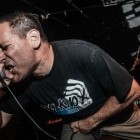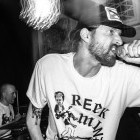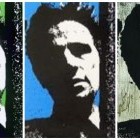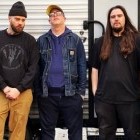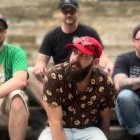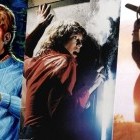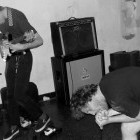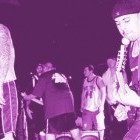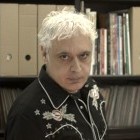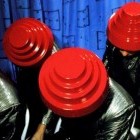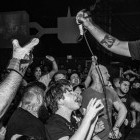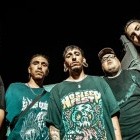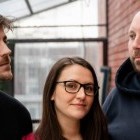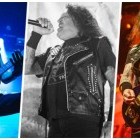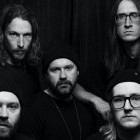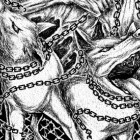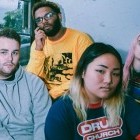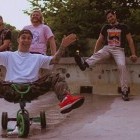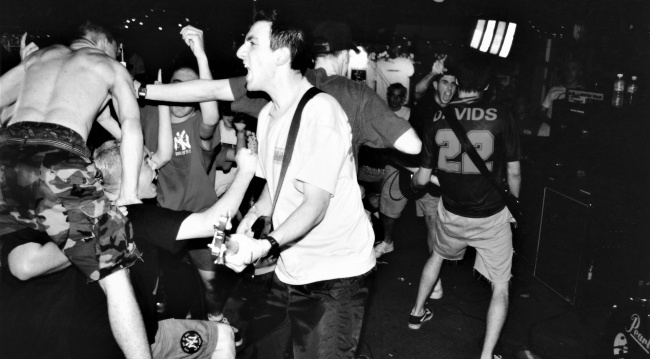
When it comes to pure impact, few bands had as much influence on '90s hardcore than In My Eyes and Ten Yard Fight did. Recording for seminal hardcore labels Revelation Records and Bridge Nine, respectively, both Boston outfits helped keep the spirit of late '80s straight edge alive during a time when it wasn't nearly as fashionable as it is today. Anthony Pappalardo played guitar in both of the aforementioned groups, and that's how he first got on my radar.
Pappalardo's gone on to play in several other bands throughout the years, but the aspect of his career I've kept up with the most has been his work as a writer for such publications as Mass Appeal and Slap. His 2008 book, Radio Silence: A Selected Visual History of American Hardcore Music, looks like it was designed by Peter Saville (it wasn't), and is filled with tons of delicious trivia-filled content that anyone who loves the kind of music we cover on this site would lap up. If you don't have it already, get on that. Oh, Pappalardo's Live...Suburbia! book from 2011 will also appeal to most folks who regularly read this site.
I had been meaning to set up an interview with Pappalardo for the last year or so, and I recently got my mission accomplished.
I have to start by asking you about your childhood. Where were you born and raised, and how would you describe your childhood?
Almost every member of my family lived in Lawrence, MA. If you’re not familiar, it’s a city about 30 miles north of Boston that followed the typical cycle of a “mill town.” There was a lot of production, it drew a lot of immigrants, the textiles left, the industry left, drugs happen, an influx of new immigrants came in the ‘70s and race relations got strained to the point of riots. My family was stubborn and prideful, as they really had some neighborhood connection or whatever and many refused to leave. The city actually lost control of its schools, because they had declined so much and are still in receivership.
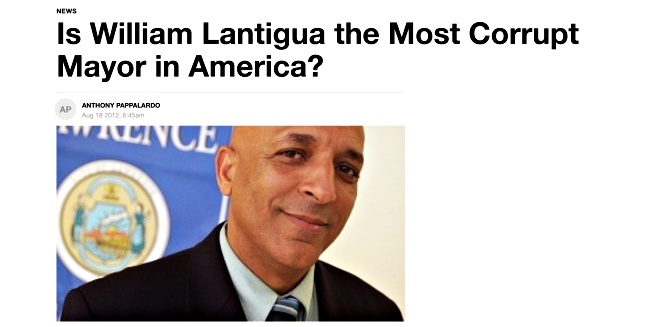
We lived in a two family house/apartment, behind a Chinese food restaurant and near mostly car garages. My parents had my sister when I was almost six, so I spent a lot of time either hanging out with adults or running around in our chain link fenced yard. There was an abandoned VW bus, but not a cool hippie one, in the backyard and I’d do dumb shit in there too—break stuff, hide things. The upside was that my aunt and uncle lived on the first floor with my grandmother and they had a ton of records, as did my dad, so I had a lot of music around me and was allowed to play records whenever.
I suck at ages, but I’m pretty sure we moved when I was 10, about 10 miles north to Salem, NH—Just over the border. 10 miles north and 10 years behind. There was no diversity or culture or any discerning flavor, just a giant strip of retail shops and a horse racing track. Parts were nice and there was a lake, but I didn’t live there. Can’t blame my parents for moving their kids to a nice boring town, where they could do suburban shit, attend a school that could lead you somewhere, and was safe, but yes, it was so fucking mundane.
SEE ALSO: Nick Woj (Cold World, Pegasus, Consolation Prize) Talks Vinyl Collecting
Before we get into music and skateboarding, what kind of TV and movie stuff did you gravitate towards as a kid? We both grew up in the VHS era, so I was curious to see if you were big into that side of pop culture as well.
Shit. My dad was such a movie buff—at least for about two genres. We had one of the first VHS players that looked more like a giant tape recorder. The remote control had a wire and all it did was pause the machine, so you could not record commercials. Like most men of his age group, he loved World War Two movies and hated Vietnam—he actually got really upset when I wanted to rent Platoon. He also worshipped really campy sci-fi movies from the ‘50s, as well as almost any adventure movie. We’re talking shit where it’s so insanely fake and shitty that they’re laughable—giant ants taking over the world or whatever. They reminded him of growing up and seeing a movie for 5 cents or whatever it cost then.
For me, I was the typical kid who loved Star Wars and KISS, as well as whatever superhero shit was on. I’d get up super early on the weekend and start watching whatever was on, getting super anxious for Saturday morning cartoons. It was mostly PBS programs about painting or fixing a house, but then by 7AM, they’d play old Marvel comics cartoons from the ‘60s. They were barely animated and really sucked, but there was something in their primitive nature that made them kind of trippy or surreal. At least that’s how I look at them now.
I mean, fuck, you’d be watching something like the Rubic’s Cube cartoon or Thundarr the Barbarian and they seemed so polished compared to the things made ten years prior. I feel like there were a lot of rushed together sci-fi or adventure type shows riding off the success of Star Wars or Indiana Jones back then, so there was always some show about some mystical man, such as The Phoenix on to amuse me, only to be replaced after a few episodes… or Buck Rogers. A movie about black holes, etc.
On Friday nights I could choose some movies to rent from the video store and I would get hyped. I’d never pick the bigger name flicks, but instead, I went for things I’d read about in Fangoria or other movie mags. I’d actually seek out the worst movies ever—Kentucky Fried Movie, Plan 9 From Outer Space, or something like that. Then later I’d rent the 7 skate videos the store had over and over.
When HBO got in the mix, it was pretty sick, because there were still so few channels. It seemed like every kid in school would watch Red Dawn or Porky’s one night, then everyone was reciting the lines on the bus the next day.
And of course, I remember MTV actually starting, like, legit, one day it’s a “new channel” that didn’t exist prior to that. “Whoa, channel 18 has videos!” And Night Flight was huge to me too, as well as V66 out of Boston. Sport too, I loved sports, but the Celtics the most.
I loved finding live videos for bands and some shops even rented bootlegs. Sure, the majority of them were dogshit, but I saw some pretty solid Iron Maiden and Priest videos before I started seeing bands live.
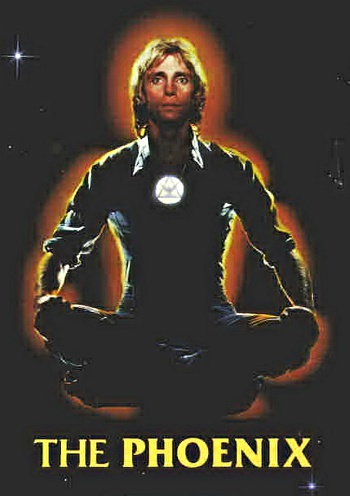
When did you start skating and learning about that culture?
My real intro to the culture of skateboarding and not just whatever was on TV was through BMX magazines, specifically Freestylin’ who would cover some skating. Also, at that time in the mid-’80s, skating was still in its “post skatepark” time, where it was super underground. There were no dedicated shops near me, so a lot of bike shops would carry decks. I got a mall board, some Variflex that barely rolled and had a snake on it—The Striker. The trucks didn’t grind either—I swear they were soft metal. On the first day of 7th grade, they had some weird scam where they’d encourage you to subscribe to magazines for some discounted rate, in an attempt to get you to read. I got Thrasher and RIP. They sold metal mags in the supermarket, so I was making my mom buy those for me when I was mad young, but they never had skate mags. I had only seen one issue of Thrasher prior to that and it was old and missing pages. I swear it took three months for the first issue to arrive and I was tripping. Then I saved up loot mowing lawns and doing random ass errands until I had the $89.95 needed to get a complete from Skully Bros. Four months later it arrived and I started skating, pretty much on my own, later finding some other kids in my town who were into it.
Funny thing about that, was that a lot of kids would skate, but didn’t “dress” like it, because it wasn’t cool and you looked like some “California asshole” or whatever. So, these dudes would dress like dirt bags/hessians during the day, but then they’d switch up into Powell sweats to go skate later. I was one of the only kids in my school that just dressed like what I was into. Weird times.
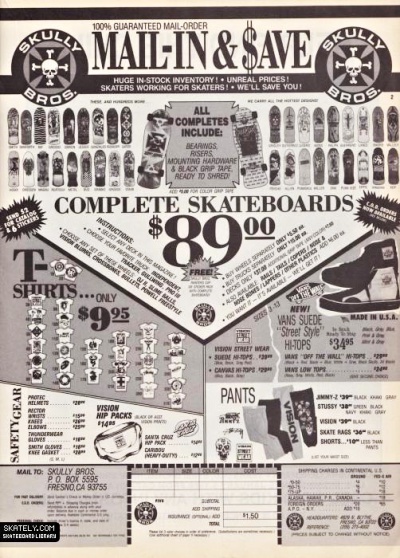
Speaking for myself, Pushead’s music writing in Thrasher helped introduce me to so many great bands at a young age.
Pushead 100% and also, when he dropped that best 100 of the ‘80s list I was even more obsessed. I mean, we were buying music based on what they mentioned in Freestylin’, which is how I got into Black Flag and SST, but Pushead’s reviews, the scene reports, and general music coverage in Thrasher, as well as Mike Gitter who I believe was published in both Thrasher and RIP, as well as doing his xXx fanzine, which I didn’t see until later… they were the ones and they completely influenced my tastes.
I completely remember New Years Eve going into 1990. My parents let me have a bunch of people over and my dad snuck us beer. We were skating in the basement and basically dividing up Pushead list, trying to divide and conquer what we didn’t own. Kind of funny, because if we had any clue, maybe we would have found an Antidote 7” or whatever other rare shit was on there. We had a TV down there and watched some MTV “New Year’s” Special and the B-52’s played. I mean yeah, "Love Shack" sucks, but the first B-52’s record is legit good.
Do you remember which hardcore band/record was the one that made you fall head over heels in love with the sound?
It’s funny, because certain bands are just in the ether. Black Flag being the best example—it’s almost like you heard them without ever actually hearing them. Oddly enough, I read this show / record release show piece in 1986 about Black Flag’s Who’s Got The 10 ½?, as well as the first Gone album and Painted Willie. Not only did it paint SST as some gang or something, it made me wanna hear all three. So, that’s the first Black Flag I heard, which is completely fucking weird, but probably telling for a person my age—this weird in between era in hardcore. I had a mental checklist of what I needed to hear, but I had no access other than the stores in the mall and later a few used shops I discovered in Salem. You’d ride your bike to the mall or when you’re mad young, you’re just with your parents and beg for a “tape.” You want D.R.I., they only had C.O.C., so you walk out with Six Songs with Mike Singing and go “cool, that’s what C.O.C. sounds like!”
That being said, I don’t know what the first hardcore band was that I heard. I really don’t [laughs].
Anyway, SST releases were easy to get and widely distributed so those were easier to find. But Black Flag was like a given—you had to like them. The first one that blew me away was the first Suicidal record, because it was cool, stupid, funny, angry, odd, and the guitars kind of weren’t even that distorted. They were a gang? Maybe? I dunno, it was exactly what I wanted and expected, unlike the Misfits that I thought would be the scariest shit of all time—heavier than the heaviest of metals—and instead they’re incredibly tuneful. I mean, i also didn’t get Earth A.D. first either. I was into metal first, and I know it sounds ridiculous to say a fucking 10-year-old was into metal, but I was allowed to buy music so early on and I just followed the progression. Then I met kids in school and we traded tapes. You always find that dude with the older brother or whatever and in my case, it was this dude Brian who had a cool older sister and would visit his dad in the summer down in Florida. He’d come back with a lot of thrash metal and death metal, I specifically remember him getting me into Cryptic Slaughter. The point being, when I got into punk or the less metallic hardcore, it actually sounded so “old’ and almost backward. I fucking loved it.
SEE ALSO: 2015 interview with Scott Peterson (Cryptic Slaughter).
I think more than any band, the early hardcore punk bands that everyone fucks with—DK’s, Minor Threat, Gang Green because they were local, oh and the Boston Not L.A. comp, M.D.C., Angry Samoans, the Proletariat. They were all so varied and interesting to me, but they all tapped into exactly what I liked. I wasn’t saying that at 13 or whatever I was so scholarly that I was like “Oh man, metal is a bit too theatrical, hardcore is something I have a sincere connection to.” Nah, not at all.
It was more like seeing your favorite color or eating some basic ass pizza and loving it more than the other shop across the street. It was, “Yes, this is the thing I like more than other things.”
What were some of the earliest hardcore shows you went to see in Boston, and was it intimidating, in terms of cliques, and all that kind of stuff?
I went to some local shows in New Hampshire first—random shit like Candy Striper Death Orgy, who were older thrash dudes that hung at high schools in the area and basically baited people to their pay-to-play gigs, but that was actually tight because they’d open or “open” for national acts, mostly at this spot at Salisbury Beach, MA called a million things, including Sneakers and the Escape Club. They all ages shows and they were a really cool spot to see kids from all over, plus it was closer to Boston. I saw Sick of It All, Biohazard, Leeway, Death, Wrecking Crew, a bunch of others that I’m forgetting, plus so many local bands that I’d end up becoming friends with and know to this day. Also saw an early version of Converge there that I think was called Blindside at the time, when they sounded more like Sheer Terror. Or maybe I thought they did. I dunno, you’re a kid and you’re dumb.
Going back, the first shows I saw were thanks to a small crew of older punks that took me to The Channel. It was really at random, Bad Religion, Ministry, Rollins Band and Naked Raygun, Suicidal Tendencies, 7 Seconds, and Slap Shot, with locals sprinkled in, but they weren’t that into hardcore. It was a bit divided in the sense that you might be a dude who is still kind of ‘80s—leather coat, you liked goth bands too, maybe even random shit like Happy Flowers or something, but had a mohawk. Then you had the Boston hardcore kids, who were the descendents of the first wave. They were kids who were more tuned into SS Decontrol and DYS—brought up or first exposed to that and then getting to ride the wave of the late-’80s, when boston had a grip of great bands and Sean “Cringe” brought every possible band through.
I think other than my first time at the Channel, I didn’t really notice much. Also, I had nothing to compare it to, so it just seemed normal and maybe a little wild. Later when I started traveling, you’d notice that a certain scene has less people or dances differently, but I think other than the shock of a first show it was all whatever.
Also, I knew a lot of people through skating before I started going to shows and that scene was intertwined, so it was like, “Hey, you going to see Judge? You going to the Eye For an Eye show? And yes, “Bosstones Sunday?” You’d just go to go.
And I loved seeing Killing Time. Just throwing that in there.
Before Ten Yard Fight, I’ve read that you played in a band called Reason to Change. Can you tell me a bit about that? With a name like that, I’m assuming you played hardcore.
Yeah, that was a band that John Lacroix and I started. It was ‘91, I believe. We were so hyped on how hardcore was in this new phase. I think Kingpin really symbolized that, as when they started they were a harder band, almost more influenced by Raw Deal and Leeway, but then it was as if they evolved into a band more influenced by Shelter or later era Verbal Assault and they were great. They were the pulse of that age group—a foot in the ‘80s and looking into the ‘90s. That was happening all over, with Another Wall, Lifetime, Ressurection, and Flagman. Eye For an Eye, Said and Done, Arise, and Third Degree were tapping into something similar, with EFAE being the stalwarts. It was exciting, ya know?
Reason to Change was our shot at that sound and I idea, but it wasn’t great. I mean, we tried or whatever, but it was an odd mix. John was into Krishna Consciousness, our bass player was cool, but more of a periphery guy—he was into hardcore and hyped on it, but also, not in the way we were and we knew he was just killing time before he studied nuclear science in Ithaca. We met the drummer randomly—this guy Joe from NH who was kind of a skinhead, but in this suburban way that you like Sam Black Chuch and metal, but also the Bruisers. He grew pot and was rad.
He wanted to sound more like Burn and we should have listened. Instead we played a show with 411, Vision (who I think didn’t show), and Said and Done, then broke up.
Let’s get into Ten Yard Fight. You’ve been critical of the whole “youth crew revival” tag that the band has been connected with through the years. Did that start coming up from the very beginning of the band?
I think so. I dunno, it’s just convenient, right? YOUTH CREW! You’re doing a YOUTH CREW JUMP! It’s like, ok. What band, in Youth of Today’s crew does the entirety of the two In My Eyes LPs sound like? Sure, there are bits and a song or two that I think suck that have elements of Youth of Today or whatever, but even our intro was intentionally to not sound like that era specifically. I mean, “Overlooked” or “A Little Too Late” were probably more like LP era Turning Point, the intro sounded like Samiam, and “Through the Motions” was inspired by Inside Out. I dunno, I’m not saying any of it is good or channeled those bands, but when I was writing tunes, I was into so much and those things seeped in. Sometimes it was a phrasing from Verbal Assault, other times it was trying to get the snare to sound like Murph from Dinosaur Jr. By the second album, I think we had found our “thing,” but didn’t play those songs together enough to make them totally work. Luke and I did, but we didn’t have a second guitar player and it was just a weird period for the band. It was never “hey let’s copy this,” but rather, “There’s a cool chord in this Ignition song, I like the chord progression that the Charlatans use—can we do that? Like, why not?”
And then being completely a fucking hardcore band, because at the end of the day, it’s kind of funny / douchey, because every band has parts or aspirations to be what they aren’t. “This one has a Rush Mosh” or whatever. It’s still a fucking mosh part. Oh, and I hate Rush. They sound like Phish or Phish sounds like Rush if they were from Vermont and hated those hats that Neil Peart wears.
Why do you think Ten Yard Fight struck a chord with so many people in the hardcore scene so quickly?
It was just dumb and familiar enough to work and we had a cool mix of people. We all had friends, had been a part of the scene, so all we had to do was execute and we did. Some of the early songs were legit bonehead riffs, but that’s what’s cool about it. We weren’t thinking too hard, we were just doing it. That’s fun.
Also, this is an era where two big things are happening: Metallic hardcore that didn’t really resemble hardcore, other than the singers not being melodic enough to be metal and this like, fourth generation Nation of Ulysses / Fugazi hybrid scene. I mean, the ideas of being politically aware were cool, but a lot of bands sucked the fun and actual emotion out of hardcore.
That’s the funniest part, these bands being called emo or proto-screamo, but there’s nothing going on but a dude singing some word association dogshit over half a Fugazi riff and everyone else noodling. Over time, it was just exhausting seeing bands just flail around to a room of kids sitting on the floor, only to break up and form four equally shitty bands.
The exception were Rye Coalition, who could play and evolved and actually had a stage presence. That’s cool. They were just a band who happened to play in that scene cos they liked it, but were also into big rock and that eventually showed.
So yeah, it’s like when you make a new product, you either make something new or something that people need. People needed that in our area and it worked, and then other areas wanted that too. There can only be one Mouthpiece, you know?
Then it became “sustainable” (kidding) for a show to be five bands that all pretty much sounded the same and it got really fucking boring.
Why did you get kicked out of Ten Yard Fight?
I was the nail that stuck up. I was very specific: We need to stop singing about football. We need to not write songs that brag about straight edge, but rather explain why we are—something actually positive. When we got signed to Equal Vision Records, it got worse, because I didn’t want to make certain things, like, why are we having a basketball jersey, but we’re a football band, I dunno. Also, I wasn’t getting along with most of the band, because of whatever dumb shit dudes in the late-teens into their 20s argue about. You’re barely a rational person, even without drugs.
For them it was like, “Why the fuck do we wanna deal with this asshole if we don’t have to?” It’s not like they were kicking Jimmy Page out of Zeppelin—it’s a dude playing power chords.
What’s funny is that they [Ten Yard Fight] told people I couldn’t play guitar. That would be really hard to suck at and also, it’s not even that important.
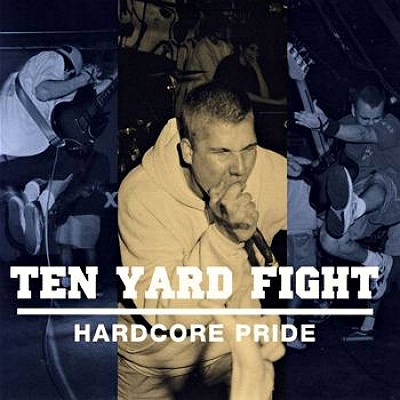
How quickly after that did you get In My Eyes up and running? Also, I know some people might think this kind of thinking is ridiculous, but if I had been in your situation, I would have partly been driven by a feeling of, “Oh, I’ll show them!”
Two months. It was really simple. I came home after getting kicked out, which was annoying, because they made me show up to practice, then they kicked me out [laughs]. It’s funny now, but like you could just call me or whatever. I came back to my apartment and was so heated, but [future In My Eyes singer] Sweet Pete was like, “It’s cool, we’ll just start a band.” It wasn’t like angsty and shit, it was more like “Yeah, this is exactly what we should do and you can do it the way you always wanted.”
We started with all these funny… well… inner rules:
- Don’t wear “old” shirts to brag. Wear shirts of new bands to support.
- We aren’t going to ever have an X on anything, because that’s cliche.
- But, we are all going to X-up.
- Everyone has to go off live.
- We aren’t having songs directly about straight edge.
I liked all that, as ridiculous as it seems.
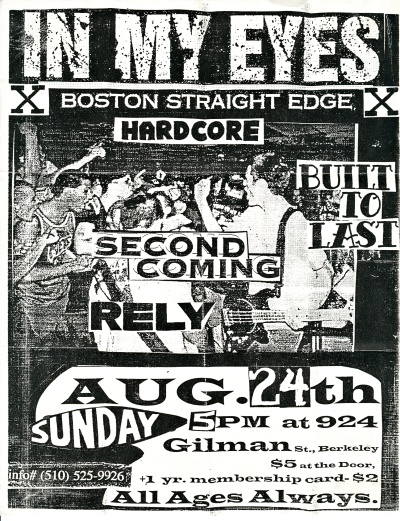
How did the deal with Revelation Records happen? Did you send them your demo, or did they reach out to you? It must have been such an exciting time for you!
Sweet Pete had been such a supporter of hardcore, from lending people money to buy equipment, putting bands up, just connecting people, that when he did a band, people wanted to help out and we were determined. It’s not Sandinista!, but we wrote and recorded a demo—none of the songs were carry overs from TYF—and were playing live and tight in two months, one of which was February, so we technically did it faster. People liked it and it was really flattering, because a bunch of labels that we like or run by people we respected offered to put out the album.
Ultimately, Revelation offered and we gladly accepted. We had a super serious offer from Victory and what they offered made sense, especially buying us a van with our own money or whatever, but it was like: Bulldog or Star? C’mon. Sure, we weren’t getting on in 1988 and it was more like, Kiss It Goodbye, Shades Apart, and Whirlpool, but it was sick as fuck. Then Better Than a Thousand, Speak 714, and Battery were on at the same time and it was a little thing.
OK, so the cover art for In My Eyes’ The Difference Between album. You got Pushead to do it! What’s the story there?
I was part of his fanclub reboot and he reached out to me, because dude knows everything and knew I was in Ten Yard Fight. He offered to do art for us, which ruled because he hadn’t been working with smaller punk bands for a while so we thought it could be cool, and most importantly it would be unexpected.
Everyone at that time assumed “live photo” or “drawing of some dude moshing.” Nope. Also, we had our friend Tony Leone design it, not only because he was in Powersurge and played the Anthrax… actually that didn’t factor at all, but it’s cool… he was a killer designer and was into really different shit, so we knew it would be out of the box. He knew all the hardcore releases we’d be compared to, so he did something different, with the primary colors.
We just didn’t want skulls and I mentioned I thought Prong Beg to Differ was cool. Now here’s something trippy, he really wanted us to release it on his label Bacteria Sour. The album would be in a black die-cut sleeve, where all you would see were the eyes, then you pulled it out and got the whole shit. That’s actually super sick—probably should have done that art that way.
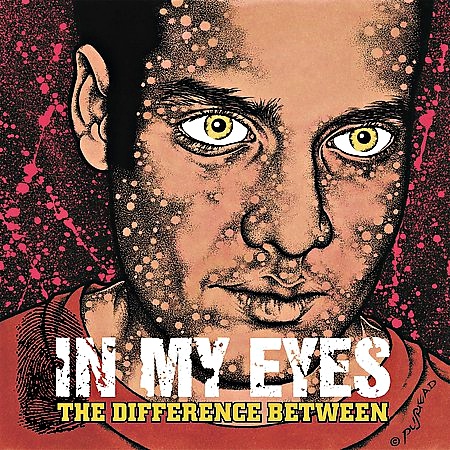
Did you guys do a lot of touring on that first album? I wanted to get your recollections on what the hardcore scene was like during that time period from your perspective.
We played every weekend, somewhere. We also did the Revelation Records Summer Tour with Speak, Better Than a Thousand, Battery, and I think that’s it. That was so fun, because, you know, you fan out. You’re on tour with [Ray] Cappo and Dan O [O'Mahony]. Also funny because they had a rocky history, so it just spiced things up. I think that tour was a month in the US and then we did another week in the fall or something. We mostly toured in the summer and would week long west coast fly outs here and there, but we constantly did long weekends, but made sure that we didn’t over play Boston.
We probably only played Boston proper 10 times.
The second In My Eyes album—Nothing to Hide—came out in 1999. Going into the writing and recording sessions, did you have specific ideas on how you wanted to improve upon the prior album?
Everything. Straight up. I don’t know why the first album sounds so dry, but it’s almost as if we had played the songs so many times that they lost something. I mean, real talk, we didn’t need over a week in the studio. That’s insane. You need the urgency. Fuck, let’s do this.
The first album was almost “slick” in the way something shouldn’t be. Also, you gotta understand that I’m telling Brian McTernan, who is putting his name on the album as producer, to make it sound like all this “shitty” recordings. I mean, to me, you can’t sound better than Screaming for Change or the Minor Threat singles, but to ask a man in 1997 to record that way, it’s not gonna happen. They’re looking to make it sound pro, because it builds your resume. You think Texas or the Promise Ring were gonna be like, “Hey Brian, love how lo-fi that In My Eyes album was, can you do that with us?”
For the second one, I just wanted to make it heavier when it needed to be, have the songs be memorable, and push the lyrics a bit. I think a lot of that worked, but a lot didn’t. Minus the lack of low end, I dig how it sounds. I think some of the way the songs were put together got a little too tricky for a hardcore bands—like, the pauses and chokes don’t always make a song better.
The big thing was just letting Pete sing with a mic and be himself, rather than standing in front of some shit. Also, I know it was the late-’90s, but man, why the fuck was everyone so afraid of reverb? Brian legit wouldn’t let us use it [laughs].
Some people complained about the album being more melodic, which is trippy to me, because the shit has songs that are some of our fastest—at least with phrasing etc. “Welcome to Boston,” “For the Moment,” “Nothing to Hide” — fast songs with a lot of energy.
There might have been too many half-time moshes though. I’ll admit that shit.
How do you feel about the album today? Do you think one album is much better than the other?
75-80% of the demo rules. I only wish a version that sounded like the cassette existed online. I really do like the second album the most, because it’s kind of fucked up—it’s really buzzy, the drums pop through, there’s not a lot of low end and I wish there was more bass/more bass driven, but it’s oddly cool.
[Drummer] Luke [Garo] worked really hard on that album too. You can hear the difference in energy. It’s not that he or anyone phoned in the first album, but by the second one we had more of a plan and knew what we had to improve on.
In reality, we [In My Eyes] shouldn’t have done two albums, but rather an LP and a 7” or whatever. Also, we buried some good jams at the end of records and that sucks. I like “Conversation Drifts” so much on the first one, but like, no one is jamming the last track.
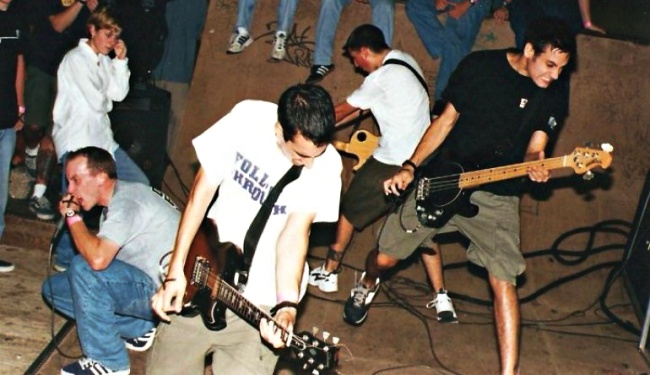
Why did you pull the plug on In My Eyes? Was it a matter of feeling like you guys accomplished everything you set out to do?
Yeah, anything more would have been overkill for us. You hit a time where it’s like, “Well, you do this forever or you say it was a good run.”
Also, there was a mini-hardcore recession and it was a weird time. I think the sound that was happening in the mid-late-’90s had to go and evolve and that’s exactly what it did. Maybe we could have turned out another 7”, but it wouldn’t have been fun. Everyone needed to do their own thing. I’m cool with that.
Sinners & Saints was a band you played in some time after that with Mark and Rob Lind. That was more of a melodic punk kind of thing, not in an Ignite way, but more along the lines of Social Distortion meets the Old 97’s. At least, that’s my take on it!
Their friend and manager Mark Viera played me some demos they had, which ended up being on the Bridge 9 LP. At first they sounded more like Turbonegro with a touch of Guns N' Roses. I never liked Guns N' Roses, but it was more that they were this rapey sounding band that just annoyed me and I didn’t like Axl’s vocals. I didn’t mind some of their (Guns N' Roses) riffs. But when Mark is writing a song that’s influenced by Guns N' Roses, it does something different, because dude loves things that are all over the map, so it sounded cool to me. And no one was wearing a top hat.
So, anyway, I heard “The Sky is Falling” and thought it was great. They had people behind them and we had shows lined up… with Social Distortion. Seemed like a total break.
I thought I would just play their songs, but we became a band right away and playing with Mark and Rob was honestly some of the most fun I’ve ever had doing anything. Not only was it fun to play and write, but it was just the nonstop comedy that went on that won’t sound remotely funny if I try to explain it.
We ended up writing a grip of songs that we never recorded that were really cool. This description will fucking suck, but it was sounding like the Replacements if they were from the UK and had Love-era Cult sounds thrown in. Power pop rock with a delay pedal, played by guys that are a little goofy a little assholey, and not really giving a fuck.
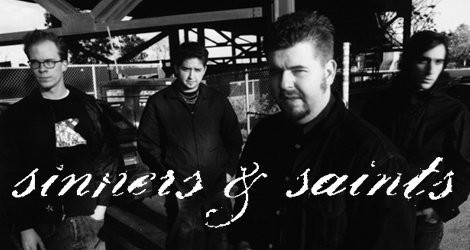
What brought on the move to NYC in the ‘00s?
Things were keeping me from New York, rather than bringing me there. At one point I was going to move there and still try to be in In My Eyes. Who knows if that would have worked? I needed a change and also, I got tired of driving down 95 to New York, having an awesome time, and then turning around and being semi-miserable.
You have to remember that the world had less connectivity then and not everything was cool and artisanal everywhere, so an abundance of places to eat that cater to your diet and bars/places where you meet people you share ideas with was something really unique to New York.
The best way to describe it, was that in Boston, I knew barely any human being that owned, let alone, hung out at some place owned by someone like them. I feel like I’m one of the only people in New York that doesn’t own a bar, restaurant, agency or brand.
There’s more opportunity here and I am in creative fields, so it’s like, “Stop being a fuckign baby and take a chance.”
SEE ALSO: 2017 interview with Jonah Jenkins (Only Living Witness, Raw Radar War, Miltown, Milligram).
Was there a long adjustment period for you?
I think it took me a while to get acclimated, but that’s more a referendum on me, not the city. I was a really immature and really only knew the situations that I created for myself—bands or whatever. That shit is cool, but it’s not always real and doesn’t translate into the lifestyle you want.
The world as a whole and NYC was going through a hard time when I moved here in 2002 and then we got GWB again. I saw a lot of people start to be like, “Yup, fuck it. Let’s do whatever, this world sucks.”
Sometimes that’s actually a good thing. I think we see a world now that has a hangover from not giving a fuck and people are trying to overcompensate so hard that it’s just static and confused.
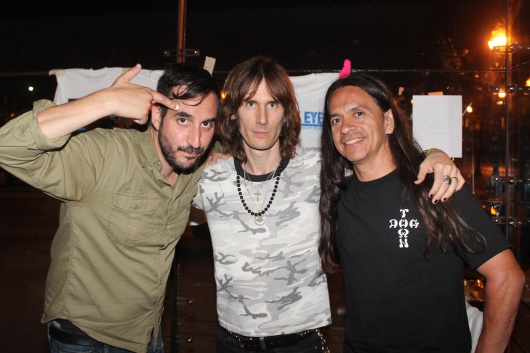
Since being in NYC, you’ve played in the bands Foreign Islands and Get Down, but by that point were you more or less committed to focusing on your freelance writing career? In other words, you weren’t that jazzed on the idea of getting in a van again to see the country.
I don’t think I played in Foreign Islands as Foreign Islands, but probably most of the same people under Get On Get On or Steady Roosevelt. Get Down was just having fun, so there was no threat of being too serious. But Foreign Islands, I was fully ready to do a band with those guys and see the world differently—tour a different way and not do it in a “hardcore” kind of lane. It’s a drag that I never got to, because what I had in In My Eyes and Sinners & Saints, as well as early on with Ten Yard Fight, I immediately found with Mark [Ryan] and Dean [Baltulonis] and it was a drag to not get more done.
I didn’t really have a plan other than to do something new and I think the timing of getting a book deal worked out for the best. It was sick to see them be able to put out music and tour. I really needed to push writing further and I’m glad that’s how it played out.
The last thing to appear on your discography was an EP called The Bells of Spring, from a kind of solo project you did as Italian Horn. Now, I had not heard anything from Italian Horn prior to prepping for this interview, but I have to say that I really enjoyed it. No bullshit there. It’s got a Guided by Voices kind of feel going on, especially how the vocals and melodies are somewhat buried in the mix. So I go on Discogs to see what kind of info I can find on the EP, and I see that Robert Pollard actually did the cover art!
Thank you. I was talking to [Cold Caves, American Nightmare vocalist] Wes Eisold about this a while back. There was a time in the early-2000s where everyone had the black Macbook and GarageBand was simple enough and shitty enough to have a really unique sound—it was analogous to how people used 4-Tracks in the ‘80s/’90s in a sense. I started off coming up with these much noisier tracks, mostly without vocals. I had an old drum machine and I’d program beats and play them through a little amp and create loops, rather than do them in the program—trying to get them dirty. I came up with a few things I thought were cool and I think I put them out somewhere as an Ep called “Gotham White” (download), but didn’t really do anything. It was like, “Oh yeah, there it is, now I’m going to go to work and then think about what I’m getting for lunch.” I haven’t heard those tracks for a good 10 years and they’re kind of interesting, in that they have these noise loops, but underneath I’m trying to have some really simple melodies. I loved Loop from the moment I heard them and followed Robert Hampson’s career, so maybe this was my attempt at blending Loop and Main, with the Uncle Bob melodies. Guided by Voices are just one of those bands you hear and fucking trip out—for me at least. Fragments, bits, epics, pop, messy, it’s all familiar, yet strange and almost from no time. Also, being able to dig into a trillion songs and albums is killer.
At some point I decided to dial it back and just explore the simple songs and got really focused. Gibby and Ryan from Dais weren’t just friends, but people gracious enough to say, “Hey, if you want to do something, we’d be down.”
The EP is a chunk of songs recorded mostly at my old apartment on 14th Street and Avenue B. It’s a little claustrophobic, a little off, and hopefully has some tracks. There’s also a cassette called Appendix Fourteen that I’m hyped on that has some songs I recorded after the 12”.
I emailed Robert Pollard’s manager and a day later he replied and said Bob was down and wanted to hear the music. He shot me back with a zip file, saying “Bob thinks these fit the album.” There were 10 or so images and that one just seemed perfect. No type or whatever, I didn’t want to fuck it up. I got a live band together but it never translated into what I liked about the Ep, which is no one’s fault. Also, we didn’t stay at it long enough for me to become a strong frontman. It’s hard, like, I didn’t want to play guitar, but that also gives you an excuse for just being mellow. I didn’t want to jump around either or try to be Bob Pollard 2.0 doing leg kicks and shit, so you really need to find yourself and that didn’t happen playing about 10 times total.
Ultimately, I didn’t have the energy to keep doing it and it fizzled out, even though it’s just as simple as making more songs. Dais is such a fantastic label—I’m so honored to be part of the discography.
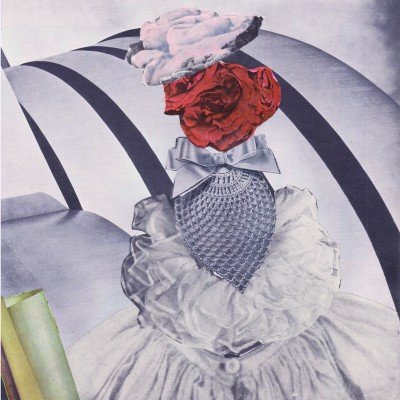
OK, before I let you go, I wanted to ask you a bit about your writing. I think Radio Silence: A Selected Visual History of American Hardcore Music is such a beautiful book. I mean that in regard to not only the way it is laid out, but also in the careful attention to detail and love that comes through in the way you presented the information. I’ve been mulling over the idea of writing a book myself, so I wanted to get your insight on that experience since it was your first.
I’m the wrong person to ask these days, because I can’t figure out what the hell to do. I don’t want to do a book about ephemera again and know I can craft a powerful narrative, but it’s like, who am I? I’m not a journalist with some scoop or a strung out blogger that got fired from a fashion mag or a celebrity who has a tell all and massive social media following.
The reality is that it’s hard to get people to bite on pitches and I’m not interested in self publishing, because I need more structure—the shit will never get done. I wrote a novella and it just went nowhere, because my agent at the time wanted to turn it into a graphic novel. Straight up, kill me.
If you want to do a book, you have to really have more than passion and an idea. You need to approach it as if you know nothing about what you’re doing and learn the process. What is the story? What are you trying to convey. It’s funny, I’ve had people say, ‘Well, Radio Silence is an art book and it’s interviews… you didn’t really ‘write’ it.’
Like, what in the fuck? We legitimately created close to 50 versions of that book and at one point it was close to 500 pages. You think it just magically shrunk to 242? You can create a narrative when you do the research and then take all the raw materials and step back. I think the mistake a lot of people make is covering something as a fan and not a documentarian, when it comes to research based books.
I’d be so interested in seeing someone like Ken Burns create a documentary series on hardcore, just to see what a serious documentarian would create. Would they be able to ask hard questions and pull out stories that we don’t see, because they aren’t so connected to it? Sure, there’s been plenty of corny news docs or whatever, but if you had someone legitimately interested in something, who wanted to learn about it, it could be really refreshing.
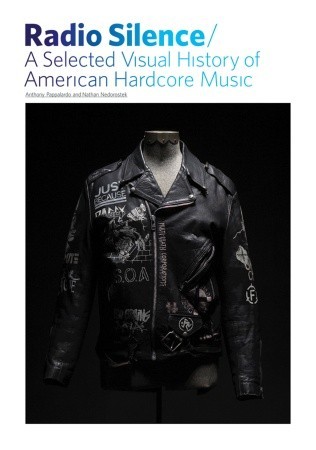
On the freelance writing side of your career, how much time do you spend pitching outlets these days? Is there an art to that? I’ve written for a living before, but I was employed at AOL Music, so I didn’t have to go out there and try and get assignments. I’m not sure if I would be good at that.
I’ve been staff and I’ve freelanced. Both are as enjoyable as the people you work with. There’s definitely an art to pitching and even how you communicate with editors. Also, you have so many people who get the title of “editor” and suddenly, they’re acting like some fucking caricature of what they imagine Anna Wintour is like or fucking Jonah Jameson. It’s corny. Like, when you don’t email me back in a day, it’s not because you’re busy, it’s because you’re deliberately trying to look important. Fuck. Off. It’s not 1950.
One thing that gets blurry now is all these brand conflicts and how they impact a pitch.
The hardest part for me is fighting to maintain my voice when I write for so many different outlets about so many different things. In a perfect world, I’d write one piece a month and really crush it. Instead, I’ve had weeks where I write six pieces. Jesus.
Are you working on any other book ideas at the moment? Surely, a skateboarding-related book must be in your future.
Not now. I worked on two books last year: The Converse One Star World Tour and Jenkem Vol. 1. Both were skate books and I’m sure I’ll do another skate-related title, but I’m really interested in trying to get into script writing at some point.
Right now we’re in a really interesting time, where how we consume media is different for every person and there’s a real desire to create stories that show true diversity. A friend of mine who works for a media agency said, “No one is looking for pitches from old white men.”
Thank god. Like, can we reach a point where Tim Allen or Ray Romano can’t get work and start fresh. Or whatever that King of Queens dude is. That humor isn’t even comedy. It’s fucking depressing.
Sorry for the tangent, but I’m more interested in working on other people’s ideas and amplifying them right now—almost like a music producer. That’s what I did with the Jenkem book and it was awesome and so fucking rewarding.
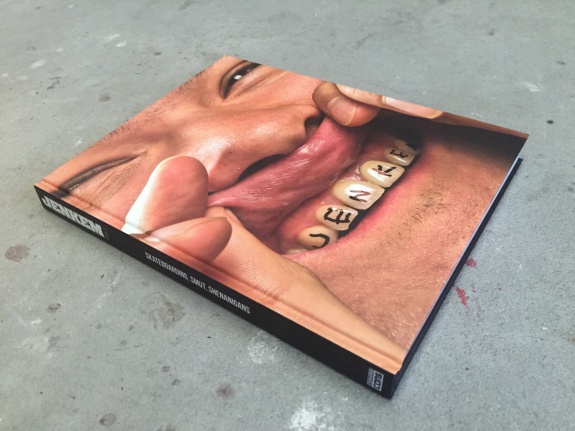
How about music? Do you ever get the itch to play in a band again?
Sure. I just got a new guitar and it’s fun as hell to play and write. You also have that itch, because writing songs is neverending. Even the most accomplished songwriters keep going, because you can always outdo yourself.
I have a very specific idea of doing something that inspired by the sound of sketchy-era Wire (IBTABA/A Bell Is a Cup… Until it's Struck) this one Breaking Circus song and this Angst tune, that just rules. Something really dry that doesn’t do much other than be a song. Will it ever happen? Probably not. I have a few Italian Horn songs sketched out and tried to people together to record them, but it never happened. The songs are too shitty to put out, but it would be tight to give them a shot.
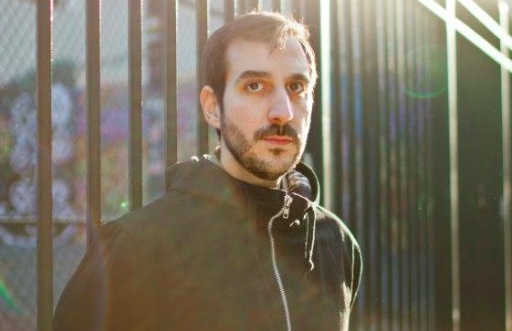
Closing this out, I wanted to put you on the spot. If you had to pick one ‘90s hardcore album to put in a time capsule that best represents that era and sound, which one would it be and why?
The Downcast 12” maybe. Didn’t that thing come with like, a 400 page booklet? I know that’s just some C.R.A.S.S. shit, but that album sums the time up. You have all these essays and like, the label owner is including his own writing in a band’s album, The actual music is totally bouncy and moshy, but they don’t want you to mosh. It’s almost cruel.
***
Anthony Pappalardo's books Radio Silence: A Selected Visual History of American Hardcore Music and Live...Suburbia! are both available on Amazon. Follow Pappalardo on Twitter, if you're into that sort of thing, and you really should be.
Tagged: anthony pappalardo, in my eyes band, radio silence hardcore book, saints and sinners band, ten yard fight

